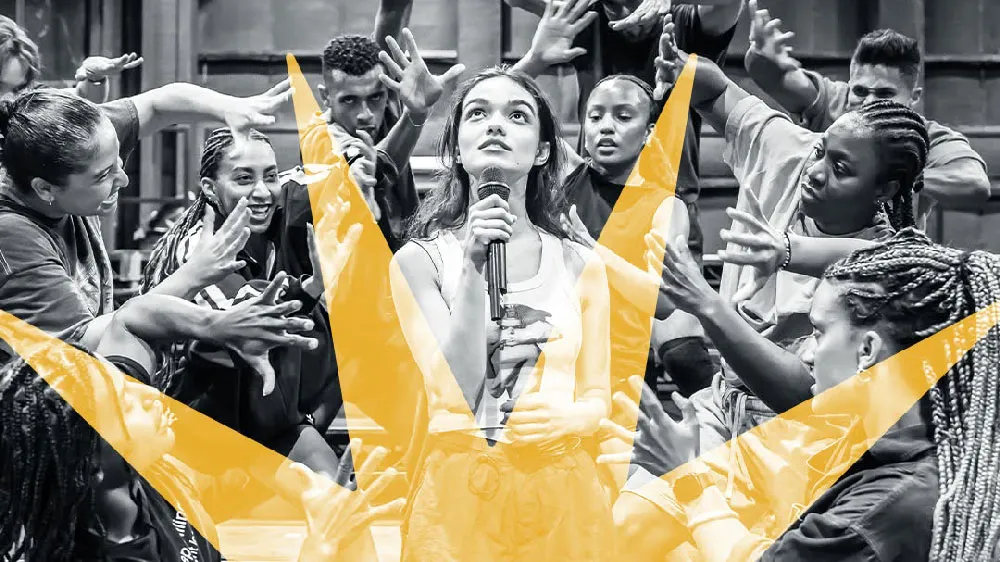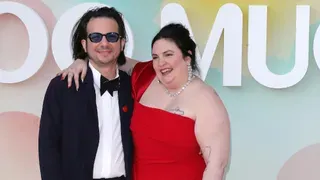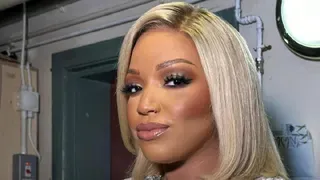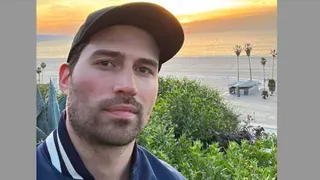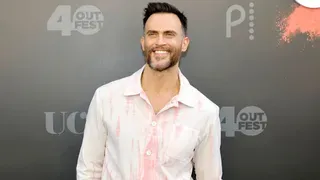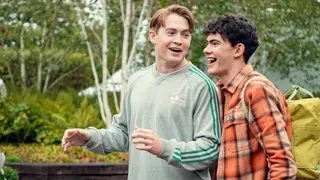November 17, 2021
Review: Queer Western 'The Power of the Dog' Confronts Homophobia, Toxic Masculinity
Megan Kearns READ TIME: 4 MIN.
Jane Campion is one of my favorite filmmakers. A painterly beauty resides in the frames in her women-centric oeuvre, which is filled with complex characters and astute observations, especially "Bright Star" and "The Piano." A simple curtain blowing in the breeze transforms to poetically majestic.
A riveting queer Western drama, "The Power of the Dog" is Campion's first film to focus on a male protagonist. Her sharp eye for shrewd commentary on gender remains; the film is a searing indictment of homophobia and toxic masculinity.
Directed and written by Campion, "The Power of the Dog" stars Benedict Cumberbatch, Kirsten Dunst, Jesse Plemons, and Kodi Smit-McPhee. It's an adaptation of the novel by Thomas Savage.
Set in 1925 Montana, Phil (Benedict Cumberbatch) and George (Jesse Plemons) are wealthy brothers who ranch cattle together. Having dinner at an inn with their ranch hands, they meet Rose (Kirsten Dunst), a widow who owns the inn, and her son, Peter (Kodi Smit-McPhee).
The opening narration immediately sets up themes of masculinity and gender, as Peter opines about saving his mother from unhappiness. A creative soul, Peter likes art and makes beautifully delicate flower bouquets from paper for the inn's tables. Phil snidely wonders "what little lady made these," mocking Peter.
George diverges from his explosive brother; he's kind, gentle, and tender. George and Rose become smitten with each other and get married, allowing Rose to send Peter to school to study medicine, like his deceased father.
Phil exhibits abusive behavior and toxic masculinity. Phil is also a closeted gay man. He obsessively talks about "Bronco Henry," a man who taught George and him how to ride horses and ranch cattle. He claims explorers Lewis and Clark were "real men." Phil fat-shames George, accusing him of being "too stupid" to finish college on his own. After George and Rose get married, Phil disturbingly abuses a horse. When Rose moves into their house, Phil taunts her verbally and in action (as Rose practices piano-playing, she falters; Phil confidently plays the same melody on his banjo). Phil and the ranch hands cruelly call Peter homophobic slurs and mock his masculinity.
Despite Phil's upper class wealth and education, he prefers to be "dirty," as he defiantly tells George. Alone at a lake, Phil caresses mud all over his naked body before going swimming. A primal, sensual gesture, it represents how Phil dons and embraces a stereotypically hyper-masculine façade, projecting brutish bravado to conceal his queerness, and also perhaps because of his internalized homophobia. Along with rugged individualism and toxic masculinity, Phil's behavior plays into the notion of the cowboy in the American West – the supposed ideal of masculinity.
Outside, the expansive cinematography showcases gorgeous mountain landscapes. Inside, the cinematography is more confining, often framing characters in doorways. It underscores the freedom of the outdoors and restrictions of the domestic sphere. In the opening scene, a doorway frames Phil with the camera inside the house looking out, reminiscent of "The Searchers." The camera is often handheld and shaky on Phil, visually reifying his dangerously chaotic nature. On other characters, the camera typically remains steady. Beautiful scenes are juxtaposed with brutality: Skinning a cow, castrating a bull, bright red blood splattering golden wheat.
Despite his initial reticence – and not inviting a friend over so as not to encounter Phil – Peter spends more time with Phil, to Rose's dismay. They ride together and privately converse, opening up to each other. In one scene, Peter gently touches a distressed Phil's arm to calm him. Phil responds by putting his hand on Peter's neck. The camera spins around them, similar to how it spins around Rose and George when she teaches him to dance, echoing an epic romance. In another scene, lighting a cigarette conveys queer intimacy, evocative of the cigarette-lighting scenes in "Now, Voyager" between Bette Davis and Paul Henreid.
The entire cast is outstanding. Benedict Cumberbatch exquisitely captures Phil's complexity and nuance: His volatility, cruelty, and inner struggles as a gay man. I'm uneasy every time I see Phil onscreen; i get a pit in my stomach waiting for him to explode like a bomb. Kirsten Dunst subtly, yet powerfully, displays Rose's discontent and protective motherhood. She's excellent, as always, conveying a woman unraveling, as Rose's drinking problem grows steadily worse. Jesse Plemons solidly portrays George's compassion and kindness. Kodi Smit-McPhee superbly vacillates between gentleness and something elusive, as there's more to him than what we might initially perceive.
"The Power of the Dog" challenges and deconstructs the mythos of the American West, which shaped our societal notions of gender, masculinity, and heteronormativity. Jane Campion masterfully conveys and confronts the detrimental destruction of homophobia and toxic masculinity. Sharply observed with complex characters and stellar performances, the compelling queer film boasts a brutal beauty and haunting power.
"The Power of the Dog" opens in select theaters November 17, 2021 and streams on Netflix on December 1, 2021.
